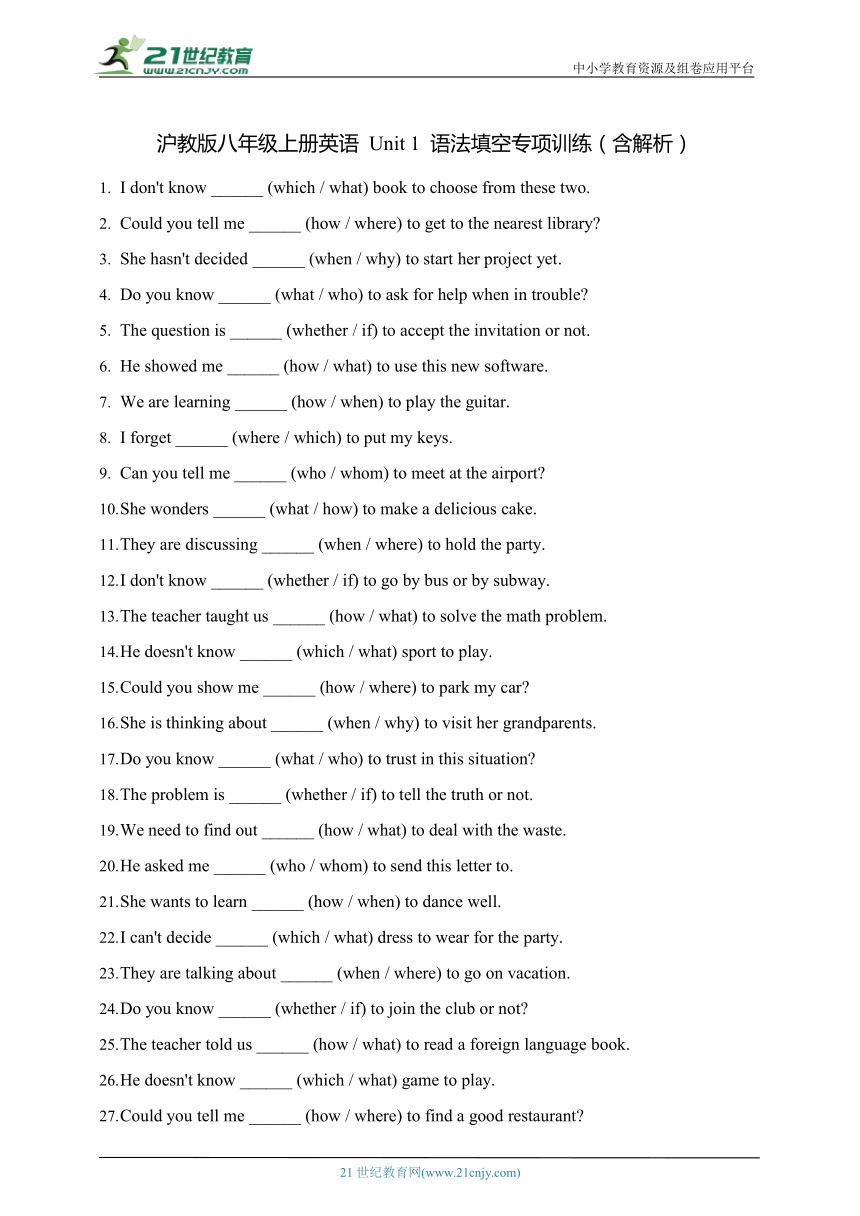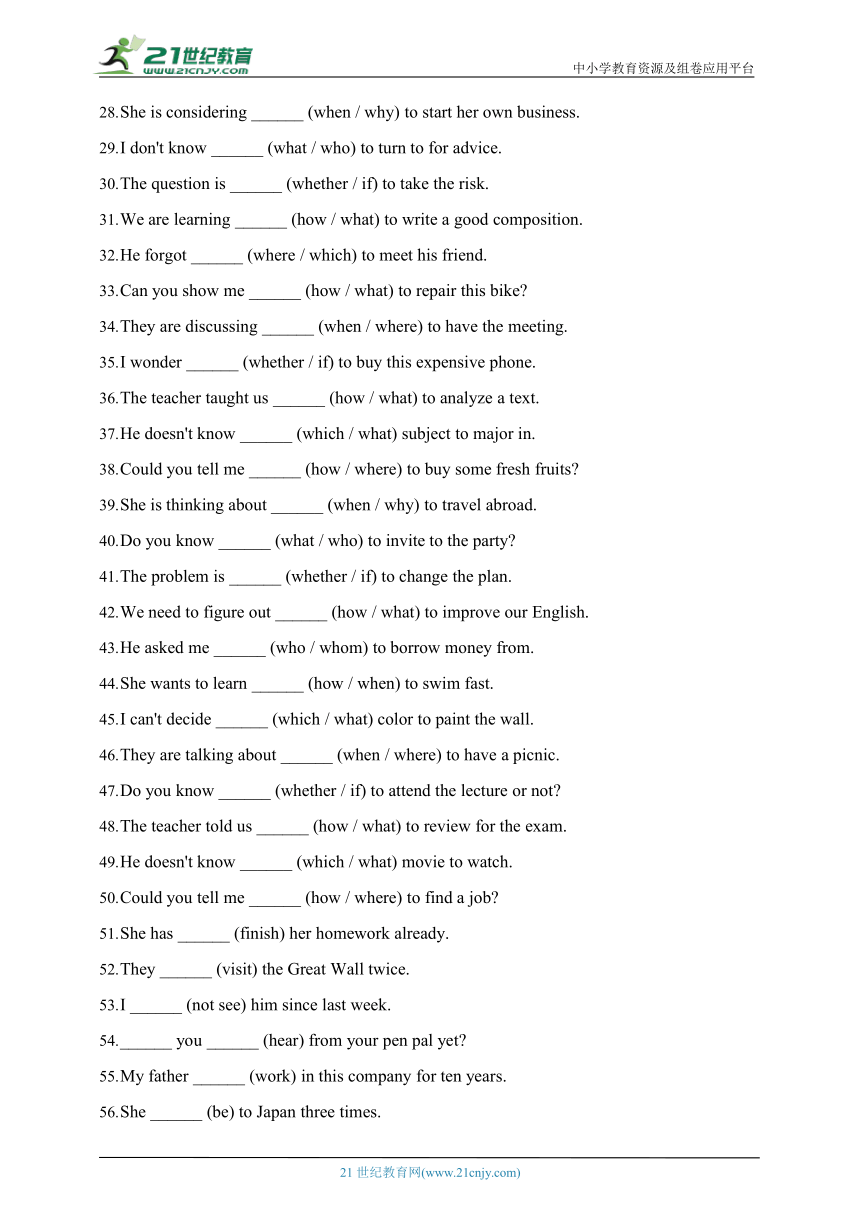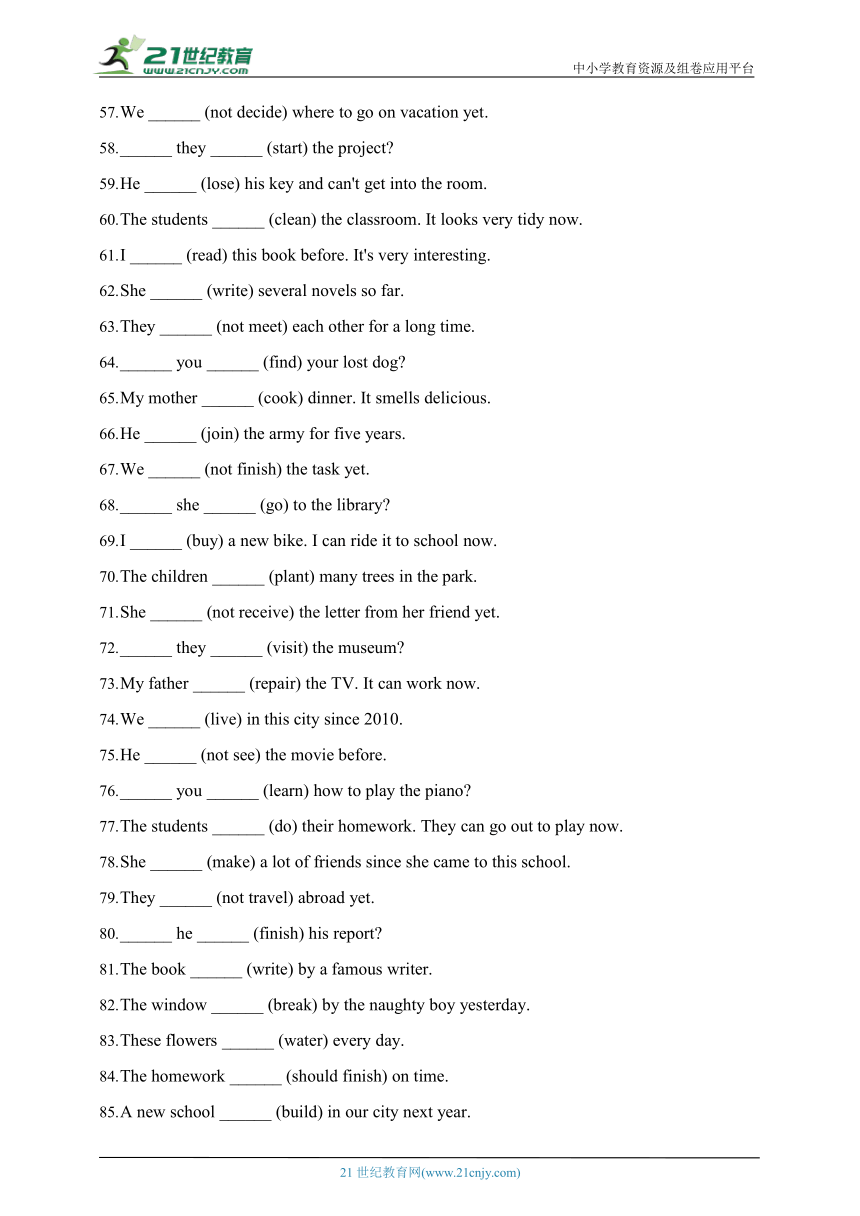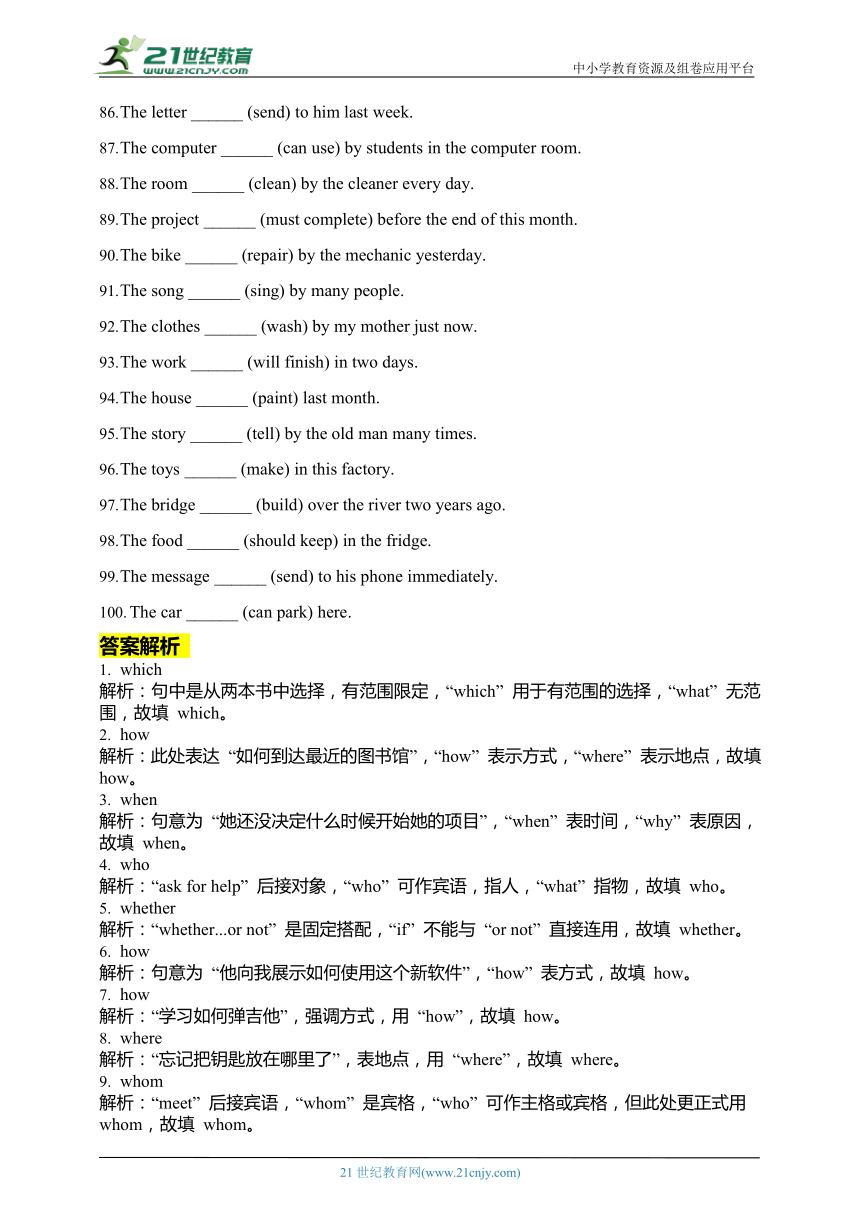Unit 1 Look it up语法填空专项训练(含答案解析)2025沪教版八年级上册英语
文档属性
| 名称 | Unit 1 Look it up语法填空专项训练(含答案解析)2025沪教版八年级上册英语 |  | |
| 格式 | docx | ||
| 文件大小 | 52.5KB | ||
| 资源类型 | 试卷 | ||
| 版本资源 | 沪教版 | ||
| 科目 | 英语 | ||
| 更新时间 | 2025-07-17 00:45:51 | ||
图片预览




文档简介
中小学教育资源及组卷应用平台
沪教版八年级上册英语 Unit 1 语法填空专项训练(含解析)
I don't know ______ (which / what) book to choose from these two.
Could you tell me ______ (how / where) to get to the nearest library
She hasn't decided ______ (when / why) to start her project yet.
Do you know ______ (what / who) to ask for help when in trouble
The question is ______ (whether / if) to accept the invitation or not.
He showed me ______ (how / what) to use this new software.
We are learning ______ (how / when) to play the guitar.
I forget ______ (where / which) to put my keys.
Can you tell me ______ (who / whom) to meet at the airport
She wonders ______ (what / how) to make a delicious cake.
They are discussing ______ (when / where) to hold the party.
I don't know ______ (whether / if) to go by bus or by subway.
The teacher taught us ______ (how / what) to solve the math problem.
He doesn't know ______ (which / what) sport to play.
Could you show me ______ (how / where) to park my car
She is thinking about ______ (when / why) to visit her grandparents.
Do you know ______ (what / who) to trust in this situation
The problem is ______ (whether / if) to tell the truth or not.
We need to find out ______ (how / what) to deal with the waste.
He asked me ______ (who / whom) to send this letter to.
She wants to learn ______ (how / when) to dance well.
I can't decide ______ (which / what) dress to wear for the party.
They are talking about ______ (when / where) to go on vacation.
Do you know ______ (whether / if) to join the club or not
The teacher told us ______ (how / what) to read a foreign language book.
He doesn't know ______ (which / what) game to play.
Could you tell me ______ (how / where) to find a good restaurant
She is considering ______ (when / why) to start her own business.
I don't know ______ (what / who) to turn to for advice.
The question is ______ (whether / if) to take the risk.
We are learning ______ (how / what) to write a good composition.
He forgot ______ (where / which) to meet his friend.
Can you show me ______ (how / what) to repair this bike
They are discussing ______ (when / where) to have the meeting.
I wonder ______ (whether / if) to buy this expensive phone.
The teacher taught us ______ (how / what) to analyze a text.
He doesn't know ______ (which / what) subject to major in.
Could you tell me ______ (how / where) to buy some fresh fruits
She is thinking about ______ (when / why) to travel abroad.
Do you know ______ (what / who) to invite to the party
The problem is ______ (whether / if) to change the plan.
We need to figure out ______ (how / what) to improve our English.
He asked me ______ (who / whom) to borrow money from.
She wants to learn ______ (how / when) to swim fast.
I can't decide ______ (which / what) color to paint the wall.
They are talking about ______ (when / where) to have a picnic.
Do you know ______ (whether / if) to attend the lecture or not
The teacher told us ______ (how / what) to review for the exam.
He doesn't know ______ (which / what) movie to watch.
Could you tell me ______ (how / where) to find a job
She has ______ (finish) her homework already.
They ______ (visit) the Great Wall twice.
I ______ (not see) him since last week.
______ you ______ (hear) from your pen pal yet
My father ______ (work) in this company for ten years.
She ______ (be) to Japan three times.
We ______ (not decide) where to go on vacation yet.
______ they ______ (start) the project
He ______ (lose) his key and can't get into the room.
The students ______ (clean) the classroom. It looks very tidy now.
I ______ (read) this book before. It's very interesting.
She ______ (write) several novels so far.
They ______ (not meet) each other for a long time.
______ you ______ (find) your lost dog
My mother ______ (cook) dinner. It smells delicious.
He ______ (join) the army for five years.
We ______ (not finish) the task yet.
______ she ______ (go) to the library
I ______ (buy) a new bike. I can ride it to school now.
The children ______ (plant) many trees in the park.
She ______ (not receive) the letter from her friend yet.
______ they ______ (visit) the museum
My father ______ (repair) the TV. It can work now.
We ______ (live) in this city since 2010.
He ______ (not see) the movie before.
______ you ______ (learn) how to play the piano
The students ______ (do) their homework. They can go out to play now.
She ______ (make) a lot of friends since she came to this school.
They ______ (not travel) abroad yet.
______ he ______ (finish) his report
The book ______ (write) by a famous writer.
The window ______ (break) by the naughty boy yesterday.
These flowers ______ (water) every day.
The homework ______ (should finish) on time.
A new school ______ (build) in our city next year.
The letter ______ (send) to him last week.
The computer ______ (can use) by students in the computer room.
The room ______ (clean) by the cleaner every day.
The project ______ (must complete) before the end of this month.
The bike ______ (repair) by the mechanic yesterday.
The song ______ (sing) by many people.
The clothes ______ (wash) by my mother just now.
The work ______ (will finish) in two days.
The house ______ (paint) last month.
The story ______ (tell) by the old man many times.
The toys ______ (make) in this factory.
The bridge ______ (build) over the river two years ago.
The food ______ (should keep) in the fridge.
The message ______ (send) to his phone immediately.
The car ______ (can park) here.
答案解析
which
解析:句中是从两本书中选择,有范围限定,“which” 用于有范围的选择,“what” 无范围,故填 which。
how
解析:此处表达 “如何到达最近的图书馆”,“how” 表示方式,“where” 表示地点,故填 how。
when
解析:句意为 “她还没决定什么时候开始她的项目”,“when” 表时间,“why” 表原因,故填 when。
who
解析:“ask for help” 后接对象,“who” 可作宾语,指人,“what” 指物,故填 who。
whether
解析:“whether...or not” 是固定搭配,“if” 不能与 “or not” 直接连用,故填 whether。
how
解析:句意为 “他向我展示如何使用这个新软件”,“how” 表方式,故填 how。
how
解析:“学习如何弹吉他”,强调方式,用 “how”,故填 how。
where
解析:“忘记把钥匙放在哪里了”,表地点,用 “where”,故填 where。
whom
解析:“meet” 后接宾语,“whom” 是宾格,“who” 可作主格或宾格,但此处更正式用 whom,故填 whom。
how
解析:“如何做美味的蛋糕”,表方式,用 “how”,故填 how。
where
解析:“讨论在哪里举办派对”,表地点,用 “where”,故填 where。
whether
解析:“whether...or not” 固定搭配,故填 whether。
how
解析:“如何解决数学问题”,表方式,用 “how”,故填 how。
which
解析:“从众多运动中选择哪一项”,有范围,用 “which”,故填 which。
where
解析:“在哪里停车”,表地点,用 “where”,故填 where。
when
解析:“考虑什么时候去看望祖父母”,表时间,用 “when”,故填 when。
who
解析:“信任谁”,指人,用 “who”,故填 who。
whether
解析:“whether...or not” 固定搭配,故填 whether。
how
解析:“how to deal with” 是固定搭配,“what” 与 “do with” 搭配,故填 how。
whom
解析:“send to” 后接宾语,指人,用 “whom”,故填 whom。
how
解析:“如何跳得好”,表方式,用 “how”,故填 how。
which
解析:“从众多裙子中选哪一条”,有范围,用 “which”,故填 which。
where
解析:“谈论去哪里度假”,表地点,用 “where”,故填 where。
whether
解析:“whether...or not” 固定搭配,故填 whether。
how
解析:“如何阅读外语书籍”,表方式,用 “how”,故填 how。
which
解析:“从众多游戏中选哪一个”,有范围,用 “which”,故填 which。
where
解析:“在哪里找到好餐馆”,表地点,用 “where”,故填 where。
when
解析:“考虑什么时候开始自己的生意”,表时间,用 “when”,故填 when。
who
解析:“向谁求助”,指人,用 “who”,故填 who。
whether
解析:“whether...or not” 固定搭配,故填 whether。
how
解析:“如何写好作文”,表方式,用 “how”,故填 how。
where
解析:“忘记在哪里见朋友”,表地点,用 “where”,故填 where。
how
解析:“如何修理自行车”,表方式,用 “how”,故填 how。
where
解析:“讨论在哪里开会”,表地点,用 “where”,故填 where。
whether
解析:“whether...or not” 此处省略 “or not”,仍用 whether,故填 whether。
how
解析:“如何分析文本”,表方式,用 “how”,故填 how。
which
解析:“从众多学科中选哪一门”,有范围,用 “which”,故填 which。
where
解析:“在哪里买新鲜水果”,表地点,用 “where”,故填 where。
when
解析:“考虑什么时候出国旅行”,表时间,用 “when”,故填 when。
who
解析:“邀请谁参加派对”,指人,用 “who”,故填 who。
whether
解析:“whether...or not” 固定搭配,故填 whether。
how
解析:“how to improve” 表示 “如何提高”,表方式,故填 how。
whom
解析:“borrow from” 后接宾语,用 “whom”,故填 whom。
how
解析:“如何游得快”,表方式,用 “how”,故填 how。
which
解析:“从众多颜色中选哪一种”,有范围,用 “which”,故填 which。
where
解析:“谈论在哪里野餐”,表地点,用 “where”,故填 where。
whether
解析:“whether...or not” 固定搭配,故填 whether。
how
解析:“如何复习备考”,表方式,用 “how”,故填 how。
which
解析:“从众多电影中选哪一部”,有范围,用 “which”,故填 which。
where
解析:“在哪里找工作”,表地点,用 “where”,故填 where。
finished
解析:“has + 过去分词” 构成现在完成时,“finish” 的过去分词是 finished,故填 finished。
have visited
解析:“twice” 是现在完成时的标志,主语是 they,用 have+visited,故填 have visited。
haven't seen
解析:“since last week” 是现在完成时的标志,否定形式用 haven't + 过去分词,故填 haven't seen。
Have;heard
解析:“yet” 是现在完成时的标志,一般疑问句将 have 提前,故填 Have;heard。
has worked
解析:“for ten years” 是现在完成时的标志,主语是 my father,用 has+worked,故填 has worked。
has been
解析:“three times” 是现在完成时的标志,“be” 的过去分词是 been,故填 has been。
haven't decided
解析:“yet” 是现在完成时的标志,否定形式用 haven't+decided,故填 haven't decided。
Have;started
解析:此处强调过去动作对现在的影响,用现在完成时,一般疑问句将 have 提前,故填 Have;started。
has lost
解析:“lost his key” 的结果是 “can't get into the room”,用现在完成时,故填 has lost。
have cleaned
解析:“It looks very tidy now” 表明动作已完成,用现在完成时,故填 have cleaned。
have read
解析:“before” 是现在完成时的标志,故填 have read。
has written
解析:“so far” 是现在完成时的标志,主语是 she,用 has+written,故填 has written。
haven't met
解析:“for a long time” 是现在完成时的标志,否定形式用 haven't+met,故填 haven't met。
Have;found
解析:此处强调是否找到的结果,用现在完成时,一般疑问句将 have 提前,故填 Have;found。
has cooked
解析:“It smells delicious” 表明动作已完成,用现在完成时,故填 has cooked。
has been in
解析:“for five years” 是延续性时间状语,“join” 是短暂性动词,需用 be in 替代,故填 has been in。
haven't finished
解析:“yet” 是现在完成时的标志,否定形式用 haven't+finished,故填 haven't finished。
Has;gone
解析:此处强调是否去了图书馆的结果,用现在完成时,主语是 she,用 has,故填 Has;gone。
have bought
解析:“I can ride it to school now” 表明动作已完成,用现在完成时,故填 have bought。
have planted
解析:“many trees in the park” 表明动作已完成,用现在完成时,故填 have planted。
hasn't received
解析:“yet” 是现在完成时的标志,否定形式用 hasn't+received,故填 hasn't received。
Have;visited
解析:此处强调是否参观过的结果,用现在完成时,一般疑问句将 have 提前,故填 Have;visited。
has repaired
解析:“It can work now” 表明动作已完成,用现在完成时,故填 has repaired。
have lived
解析:“since 2010” 是现在完成时的标志,故填 have lived。
hasn't seen
解析:“before” 是现在完成时的标志,否定形式用 hasn't+seen,故填 hasn't seen。
Have;learned
解析:此处强调是否学会的结果,用现在完成时,一般疑问句将 have 提前,故填 Have;learned。
have done
解析:“They can go out to play now” 表明动作已完成,用现在完成时,故填 have done。
has made
解析:“since she came to this school” 是现在完成时的标志,主语是 she,用 has+made,故填 has made。
haven't traveled
解析:“yet” 是现在完成时的标志,否定形式用 haven't+traveled,故填 haven't traveled。
Has;finished
解析:此处强调是否完成报告的结果,用现在完成时,主语是 he,用 has,故填 Has;finished。
was written
解析:书是被写的,用被动语态,动作发生在过去,用一般过去时的被动语态,故填 was written。
was broken
解析:窗户是被打破的,“yesterday” 表明用一般过去时的被动语态,故填 was broken。
are watered
解析:花是被浇水的,“every day” 表明用一般现在时的被动语态,故填 are watered。
should be finished
解析:作业是被完成的,情态动词的被动语态结构是 “情态动词 + be + 过去分词”,故填 should be finished。
will be built
解析:学校是被建造的,“next year” 表明用一般将来时的被动语态,故填 will be built。
was sent
解析:信是被寄的,“last week” 表明用一般过去时的被动语态,故填 was sent。
can be used
解析:电脑是被使用的,情态动词的被动语态结构是 “情态动词 + be + 过去分词”,故填 can be used。
is cleaned
解析:房间是被打扫的,“every day” 表明用一般现在时的被动语态,故填 is cleaned。
must be completed
解析:项目是被完成的,情态动词的被动语态结构是 “情态动词 + be + 过去分词”,故填 must be completed。
was repaired
解析:自行车是被修理的,“yesterday” 表明用一般过去时的被动语态,故填 was repaired。
is sung
解析:歌是被唱的,此处表常态,用一般现在时的被动语态,故填 is sung。
were washed
解析:衣服是被洗的,“just now” 表明用一般过去时的被动语态,故填 were washed。
will be finished
解析:工作是被完成的,“in two days” 表明用一般将来时的被动语态,故填 will be finished。
was painted
解析:房子是被粉刷的,“last month” 表明用一般过去时的被动语态,故填 was painted。
has been told
解析:故事是被讲的,“many times” 表明用现在完成时的被动语态,故填 has been told。
are made
解析:玩具是被制造的,此处表常态,用一般现在时的被动语态,故填 are made。
was built
解析:桥是被建造的,“two years ago” 表明用一般过去时的被动语态,故填 was built。
should be kept
解析:食物是被保存的,情态动词的被动语态结构是 “情态动词 + be + 过去分词”,故填 should be kept。
will be sent
解析:信息是被发送的,此处表将来,用一般将来时的被动语态,故填 will be sent。
can be parked
解析:车是被停放的,情态动词的被动语态结构是 “情态动词 + be + 过去分词”,故填 can be parked。
21世纪教育网 www.21cnjy.com 精品试卷·第 2 页 (共 2 页)
21世纪教育网(www.21cnjy.com)
沪教版八年级上册英语 Unit 1 语法填空专项训练(含解析)
I don't know ______ (which / what) book to choose from these two.
Could you tell me ______ (how / where) to get to the nearest library
She hasn't decided ______ (when / why) to start her project yet.
Do you know ______ (what / who) to ask for help when in trouble
The question is ______ (whether / if) to accept the invitation or not.
He showed me ______ (how / what) to use this new software.
We are learning ______ (how / when) to play the guitar.
I forget ______ (where / which) to put my keys.
Can you tell me ______ (who / whom) to meet at the airport
She wonders ______ (what / how) to make a delicious cake.
They are discussing ______ (when / where) to hold the party.
I don't know ______ (whether / if) to go by bus or by subway.
The teacher taught us ______ (how / what) to solve the math problem.
He doesn't know ______ (which / what) sport to play.
Could you show me ______ (how / where) to park my car
She is thinking about ______ (when / why) to visit her grandparents.
Do you know ______ (what / who) to trust in this situation
The problem is ______ (whether / if) to tell the truth or not.
We need to find out ______ (how / what) to deal with the waste.
He asked me ______ (who / whom) to send this letter to.
She wants to learn ______ (how / when) to dance well.
I can't decide ______ (which / what) dress to wear for the party.
They are talking about ______ (when / where) to go on vacation.
Do you know ______ (whether / if) to join the club or not
The teacher told us ______ (how / what) to read a foreign language book.
He doesn't know ______ (which / what) game to play.
Could you tell me ______ (how / where) to find a good restaurant
She is considering ______ (when / why) to start her own business.
I don't know ______ (what / who) to turn to for advice.
The question is ______ (whether / if) to take the risk.
We are learning ______ (how / what) to write a good composition.
He forgot ______ (where / which) to meet his friend.
Can you show me ______ (how / what) to repair this bike
They are discussing ______ (when / where) to have the meeting.
I wonder ______ (whether / if) to buy this expensive phone.
The teacher taught us ______ (how / what) to analyze a text.
He doesn't know ______ (which / what) subject to major in.
Could you tell me ______ (how / where) to buy some fresh fruits
She is thinking about ______ (when / why) to travel abroad.
Do you know ______ (what / who) to invite to the party
The problem is ______ (whether / if) to change the plan.
We need to figure out ______ (how / what) to improve our English.
He asked me ______ (who / whom) to borrow money from.
She wants to learn ______ (how / when) to swim fast.
I can't decide ______ (which / what) color to paint the wall.
They are talking about ______ (when / where) to have a picnic.
Do you know ______ (whether / if) to attend the lecture or not
The teacher told us ______ (how / what) to review for the exam.
He doesn't know ______ (which / what) movie to watch.
Could you tell me ______ (how / where) to find a job
She has ______ (finish) her homework already.
They ______ (visit) the Great Wall twice.
I ______ (not see) him since last week.
______ you ______ (hear) from your pen pal yet
My father ______ (work) in this company for ten years.
She ______ (be) to Japan three times.
We ______ (not decide) where to go on vacation yet.
______ they ______ (start) the project
He ______ (lose) his key and can't get into the room.
The students ______ (clean) the classroom. It looks very tidy now.
I ______ (read) this book before. It's very interesting.
She ______ (write) several novels so far.
They ______ (not meet) each other for a long time.
______ you ______ (find) your lost dog
My mother ______ (cook) dinner. It smells delicious.
He ______ (join) the army for five years.
We ______ (not finish) the task yet.
______ she ______ (go) to the library
I ______ (buy) a new bike. I can ride it to school now.
The children ______ (plant) many trees in the park.
She ______ (not receive) the letter from her friend yet.
______ they ______ (visit) the museum
My father ______ (repair) the TV. It can work now.
We ______ (live) in this city since 2010.
He ______ (not see) the movie before.
______ you ______ (learn) how to play the piano
The students ______ (do) their homework. They can go out to play now.
She ______ (make) a lot of friends since she came to this school.
They ______ (not travel) abroad yet.
______ he ______ (finish) his report
The book ______ (write) by a famous writer.
The window ______ (break) by the naughty boy yesterday.
These flowers ______ (water) every day.
The homework ______ (should finish) on time.
A new school ______ (build) in our city next year.
The letter ______ (send) to him last week.
The computer ______ (can use) by students in the computer room.
The room ______ (clean) by the cleaner every day.
The project ______ (must complete) before the end of this month.
The bike ______ (repair) by the mechanic yesterday.
The song ______ (sing) by many people.
The clothes ______ (wash) by my mother just now.
The work ______ (will finish) in two days.
The house ______ (paint) last month.
The story ______ (tell) by the old man many times.
The toys ______ (make) in this factory.
The bridge ______ (build) over the river two years ago.
The food ______ (should keep) in the fridge.
The message ______ (send) to his phone immediately.
The car ______ (can park) here.
答案解析
which
解析:句中是从两本书中选择,有范围限定,“which” 用于有范围的选择,“what” 无范围,故填 which。
how
解析:此处表达 “如何到达最近的图书馆”,“how” 表示方式,“where” 表示地点,故填 how。
when
解析:句意为 “她还没决定什么时候开始她的项目”,“when” 表时间,“why” 表原因,故填 when。
who
解析:“ask for help” 后接对象,“who” 可作宾语,指人,“what” 指物,故填 who。
whether
解析:“whether...or not” 是固定搭配,“if” 不能与 “or not” 直接连用,故填 whether。
how
解析:句意为 “他向我展示如何使用这个新软件”,“how” 表方式,故填 how。
how
解析:“学习如何弹吉他”,强调方式,用 “how”,故填 how。
where
解析:“忘记把钥匙放在哪里了”,表地点,用 “where”,故填 where。
whom
解析:“meet” 后接宾语,“whom” 是宾格,“who” 可作主格或宾格,但此处更正式用 whom,故填 whom。
how
解析:“如何做美味的蛋糕”,表方式,用 “how”,故填 how。
where
解析:“讨论在哪里举办派对”,表地点,用 “where”,故填 where。
whether
解析:“whether...or not” 固定搭配,故填 whether。
how
解析:“如何解决数学问题”,表方式,用 “how”,故填 how。
which
解析:“从众多运动中选择哪一项”,有范围,用 “which”,故填 which。
where
解析:“在哪里停车”,表地点,用 “where”,故填 where。
when
解析:“考虑什么时候去看望祖父母”,表时间,用 “when”,故填 when。
who
解析:“信任谁”,指人,用 “who”,故填 who。
whether
解析:“whether...or not” 固定搭配,故填 whether。
how
解析:“how to deal with” 是固定搭配,“what” 与 “do with” 搭配,故填 how。
whom
解析:“send to” 后接宾语,指人,用 “whom”,故填 whom。
how
解析:“如何跳得好”,表方式,用 “how”,故填 how。
which
解析:“从众多裙子中选哪一条”,有范围,用 “which”,故填 which。
where
解析:“谈论去哪里度假”,表地点,用 “where”,故填 where。
whether
解析:“whether...or not” 固定搭配,故填 whether。
how
解析:“如何阅读外语书籍”,表方式,用 “how”,故填 how。
which
解析:“从众多游戏中选哪一个”,有范围,用 “which”,故填 which。
where
解析:“在哪里找到好餐馆”,表地点,用 “where”,故填 where。
when
解析:“考虑什么时候开始自己的生意”,表时间,用 “when”,故填 when。
who
解析:“向谁求助”,指人,用 “who”,故填 who。
whether
解析:“whether...or not” 固定搭配,故填 whether。
how
解析:“如何写好作文”,表方式,用 “how”,故填 how。
where
解析:“忘记在哪里见朋友”,表地点,用 “where”,故填 where。
how
解析:“如何修理自行车”,表方式,用 “how”,故填 how。
where
解析:“讨论在哪里开会”,表地点,用 “where”,故填 where。
whether
解析:“whether...or not” 此处省略 “or not”,仍用 whether,故填 whether。
how
解析:“如何分析文本”,表方式,用 “how”,故填 how。
which
解析:“从众多学科中选哪一门”,有范围,用 “which”,故填 which。
where
解析:“在哪里买新鲜水果”,表地点,用 “where”,故填 where。
when
解析:“考虑什么时候出国旅行”,表时间,用 “when”,故填 when。
who
解析:“邀请谁参加派对”,指人,用 “who”,故填 who。
whether
解析:“whether...or not” 固定搭配,故填 whether。
how
解析:“how to improve” 表示 “如何提高”,表方式,故填 how。
whom
解析:“borrow from” 后接宾语,用 “whom”,故填 whom。
how
解析:“如何游得快”,表方式,用 “how”,故填 how。
which
解析:“从众多颜色中选哪一种”,有范围,用 “which”,故填 which。
where
解析:“谈论在哪里野餐”,表地点,用 “where”,故填 where。
whether
解析:“whether...or not” 固定搭配,故填 whether。
how
解析:“如何复习备考”,表方式,用 “how”,故填 how。
which
解析:“从众多电影中选哪一部”,有范围,用 “which”,故填 which。
where
解析:“在哪里找工作”,表地点,用 “where”,故填 where。
finished
解析:“has + 过去分词” 构成现在完成时,“finish” 的过去分词是 finished,故填 finished。
have visited
解析:“twice” 是现在完成时的标志,主语是 they,用 have+visited,故填 have visited。
haven't seen
解析:“since last week” 是现在完成时的标志,否定形式用 haven't + 过去分词,故填 haven't seen。
Have;heard
解析:“yet” 是现在完成时的标志,一般疑问句将 have 提前,故填 Have;heard。
has worked
解析:“for ten years” 是现在完成时的标志,主语是 my father,用 has+worked,故填 has worked。
has been
解析:“three times” 是现在完成时的标志,“be” 的过去分词是 been,故填 has been。
haven't decided
解析:“yet” 是现在完成时的标志,否定形式用 haven't+decided,故填 haven't decided。
Have;started
解析:此处强调过去动作对现在的影响,用现在完成时,一般疑问句将 have 提前,故填 Have;started。
has lost
解析:“lost his key” 的结果是 “can't get into the room”,用现在完成时,故填 has lost。
have cleaned
解析:“It looks very tidy now” 表明动作已完成,用现在完成时,故填 have cleaned。
have read
解析:“before” 是现在完成时的标志,故填 have read。
has written
解析:“so far” 是现在完成时的标志,主语是 she,用 has+written,故填 has written。
haven't met
解析:“for a long time” 是现在完成时的标志,否定形式用 haven't+met,故填 haven't met。
Have;found
解析:此处强调是否找到的结果,用现在完成时,一般疑问句将 have 提前,故填 Have;found。
has cooked
解析:“It smells delicious” 表明动作已完成,用现在完成时,故填 has cooked。
has been in
解析:“for five years” 是延续性时间状语,“join” 是短暂性动词,需用 be in 替代,故填 has been in。
haven't finished
解析:“yet” 是现在完成时的标志,否定形式用 haven't+finished,故填 haven't finished。
Has;gone
解析:此处强调是否去了图书馆的结果,用现在完成时,主语是 she,用 has,故填 Has;gone。
have bought
解析:“I can ride it to school now” 表明动作已完成,用现在完成时,故填 have bought。
have planted
解析:“many trees in the park” 表明动作已完成,用现在完成时,故填 have planted。
hasn't received
解析:“yet” 是现在完成时的标志,否定形式用 hasn't+received,故填 hasn't received。
Have;visited
解析:此处强调是否参观过的结果,用现在完成时,一般疑问句将 have 提前,故填 Have;visited。
has repaired
解析:“It can work now” 表明动作已完成,用现在完成时,故填 has repaired。
have lived
解析:“since 2010” 是现在完成时的标志,故填 have lived。
hasn't seen
解析:“before” 是现在完成时的标志,否定形式用 hasn't+seen,故填 hasn't seen。
Have;learned
解析:此处强调是否学会的结果,用现在完成时,一般疑问句将 have 提前,故填 Have;learned。
have done
解析:“They can go out to play now” 表明动作已完成,用现在完成时,故填 have done。
has made
解析:“since she came to this school” 是现在完成时的标志,主语是 she,用 has+made,故填 has made。
haven't traveled
解析:“yet” 是现在完成时的标志,否定形式用 haven't+traveled,故填 haven't traveled。
Has;finished
解析:此处强调是否完成报告的结果,用现在完成时,主语是 he,用 has,故填 Has;finished。
was written
解析:书是被写的,用被动语态,动作发生在过去,用一般过去时的被动语态,故填 was written。
was broken
解析:窗户是被打破的,“yesterday” 表明用一般过去时的被动语态,故填 was broken。
are watered
解析:花是被浇水的,“every day” 表明用一般现在时的被动语态,故填 are watered。
should be finished
解析:作业是被完成的,情态动词的被动语态结构是 “情态动词 + be + 过去分词”,故填 should be finished。
will be built
解析:学校是被建造的,“next year” 表明用一般将来时的被动语态,故填 will be built。
was sent
解析:信是被寄的,“last week” 表明用一般过去时的被动语态,故填 was sent。
can be used
解析:电脑是被使用的,情态动词的被动语态结构是 “情态动词 + be + 过去分词”,故填 can be used。
is cleaned
解析:房间是被打扫的,“every day” 表明用一般现在时的被动语态,故填 is cleaned。
must be completed
解析:项目是被完成的,情态动词的被动语态结构是 “情态动词 + be + 过去分词”,故填 must be completed。
was repaired
解析:自行车是被修理的,“yesterday” 表明用一般过去时的被动语态,故填 was repaired。
is sung
解析:歌是被唱的,此处表常态,用一般现在时的被动语态,故填 is sung。
were washed
解析:衣服是被洗的,“just now” 表明用一般过去时的被动语态,故填 were washed。
will be finished
解析:工作是被完成的,“in two days” 表明用一般将来时的被动语态,故填 will be finished。
was painted
解析:房子是被粉刷的,“last month” 表明用一般过去时的被动语态,故填 was painted。
has been told
解析:故事是被讲的,“many times” 表明用现在完成时的被动语态,故填 has been told。
are made
解析:玩具是被制造的,此处表常态,用一般现在时的被动语态,故填 are made。
was built
解析:桥是被建造的,“two years ago” 表明用一般过去时的被动语态,故填 was built。
should be kept
解析:食物是被保存的,情态动词的被动语态结构是 “情态动词 + be + 过去分词”,故填 should be kept。
will be sent
解析:信息是被发送的,此处表将来,用一般将来时的被动语态,故填 will be sent。
can be parked
解析:车是被停放的,情态动词的被动语态结构是 “情态动词 + be + 过去分词”,故填 can be parked。
21世纪教育网 www.21cnjy.com 精品试卷·第 2 页 (共 2 页)
21世纪教育网(www.21cnjy.com)
同课章节目录
